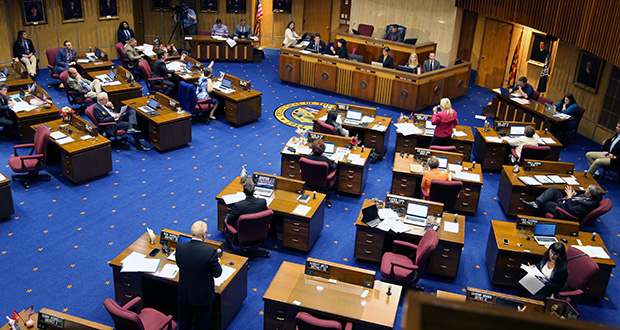The state Legislature is nearing the halfway mark for committee hearings. The House committees have completed their consideration of bills that originated in the House, while the Senate committees have heard bills that originated in the Senate. Except for some agency continuation bills that will be heard in the Senate Health Committee, only the House and Senate Appropriations Committees are meeting this week to consider a full slate of bills.
Beginning next week, committees will begin to hear bills that originated in the opposite chamber.
Here’s a look at where issues of importance to the business community stand in the legislative process:
Extension of the Arizona Commerce Authority
State agencies’ lifespans are set by the Legislature and undergo reviews by the auditor general at the end of their terms. The Arizona Commerce Authority, the state’s lead economic development agency, is up for renewal this year.
HB 2417, sponsored by Rep. David Livingston (R-Peoria), would extend the ACA for an additional four years.
The Arizona Chamber of Commerce & Industry has made the ACA’s extension a priority for the session.
“The ACA has proven essential to the state’s economic success for more than a decade,” Chamber Vice President of Government Affairs Courtney Coolidge said. “We appreciate Rep. Livingston for sponsoring the bill and we’ll continue to stress to legislators the consequences of not renewing the ACA.”
The House Appropriations Committee passed Livingston’s bill 14-2. It will head to the House floor for a vote after it’s cleared by the Rules Committee.
Renewal of Proposition 123 funding
Arizona voters in a 2016 special election passed Proposition 123, which increased investment in K-12 education by $3.5 billion and ended a long lawsuit over previous state budgets’ K-12 funding levels.
The proposition is nearing the end of its 10-year lifespan, and the business community has identified a refreshed measure as a necessity to avoid a reduction in funding.
Both the governor and legislators have their own plans for a successor to Proposition 123, with varying levels of disbursements proposed from the state land trust to schools.
“We appreciate that the Legislature and the Governor’s Office are making the extension of Prop. 123 a priority,” Coolidge said. “We hope stakeholders can get together to refer a solution that will resonate with voters and pass in November to ensure public education continues to receive these critical dollars.”
Greater transparency in third party litigation funding
HB 2638, the Litigation Investment Safeguards and Transparency Act, sponsored by Rep. Travis Grantham (R-Gilbert), would make the often-secretive practice of third-party litigation financing, where a lender bankrolls a lawsuit in exchange for a cut of the settlement or award, more transparent to defendants and courts.
Litigation funding has grown in popularity among big-dollar benefactors, including hedge funds and private equity firms, looking to make a return on lawsuits. Opponents argue that the practice can extend litigation, causing plaintiffs to cut off settlement talks so a greater return can be delivered to the lawsuit’s financial backer.
Due to concerns that third-party funders are directing legal strategy, Grantham’s bill ensures decision-making over a case’s strategy rests with the plaintiff, not the outside funder, and it would force the funder to cover any sanctions associated with bringing a frivolous lawsuit. The bill also says litigation financing must be disclosed to an attorney’s clients, the court, and all parties in litigation.
“Our legal system is one of Arizona’s competitive advantages, ensuring plaintiffs and defendants are on an even playing field,” Coolidge said. “This bill would be an important civil justice reform.”
The bill passed the House Judiciary Committee last week and now heads to the Rules Committee before it can proceed to the full House for a vote.
















Add comment